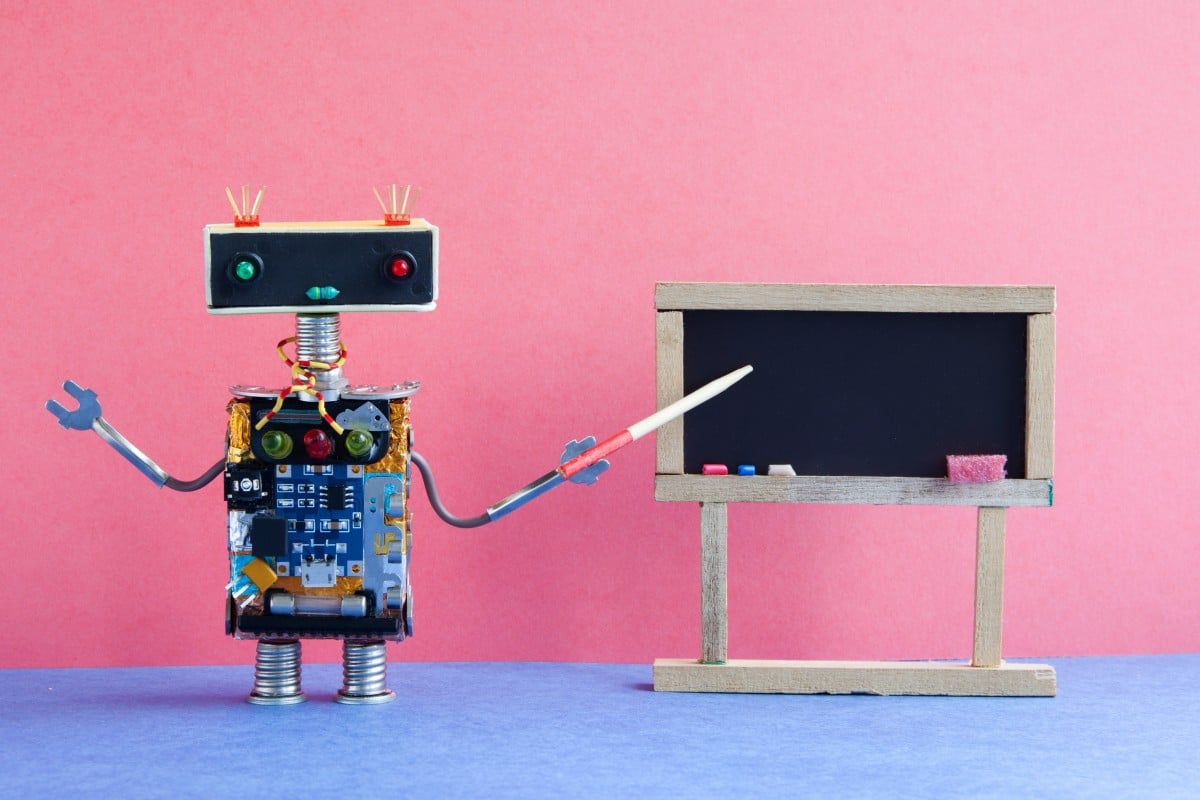
- Each week, two of our readers debate a hot topic in a showdown that does not necessarily reflect their personal viewpoints
- This week, they debate if teachers will one day be replaced by robots - and whether that’s a good thing
 OK class, it’s snack time! Take out your motor oil I mean human food. Photo: Shutterstock
OK class, it’s snack time! Take out your motor oil I mean human food. Photo: ShutterstockIf you are interested in joining future Face Off debates, fill out this form to submit your application.
For: Victor Wu, 16, Burnaby South Secondary School
Every industry strives for perfection, and education is no exception. A new, improved way of doing things is just around the corner, and it simply makes sense that robots are the future of education.
To start, robots would make much better teachers, as they are able to respond to students and situations faster and more accurately.
According to the Gotham Gazette, an online publication based in New York City, a teacher makes about 130 decisions per hour in an average six-hour school day, and they have to make them quickly, which means there’s a lot of opportunity for error. They also have to take on a number of different roles for their students: they are mediators, surrogate parents, nurses, and more.
Facebook’s Meta to push virtual reality initiatives to Hong Kong cafes and schools
Based on all these numbers and their duties, mistakes are bound to happen. If a teacher can’t consistently identify and correct their errors, this can affect their students’ learning and attitude in the long term. A robot, however, would give more accurate information and better identify issues with their students and correct them quickly.
What about the argument that teachers are crucial for helping students develop their non-academic skills, such as their emotional development, and that robots can’t keep up?
That is the opposite of what happened in a school district in Boston, in the US state of Massachusetts, in early 2020, where Cynthia Breazeal, an associate professor of Media Arts and Sciences at the MIT media lab, tested out her social robot in select classrooms.
This robot looked like a teddy bear and was able to interact with kids and solve puzzles. It was programmed with a “growth mindset” – the idea that failure is an opportunity to learn something new – and after interacting with the robot, students were able to model the device’s way of thinking and become more perseverant when solving their puzzles. This shows robots can help students become well-rounded people.
Robots have helped society advance and achieve previously unattainable goals; it’s just a matter of time before they become the pinnacle of education.
New technology allows future generations to hear from survivors of the Holocaust, even after death
Against: Calissa Poon, 10, Diocesan Girls’ Junior School
Undoubtedly, robots can be useful in education: for example, story-reading robots have been used to teach basic language skills to young children. While the thought of an infallible robot teaching in a classroom might seem promising, they are far from being the future of education.
First off, a crucial part of education is the development of critical thinking and interpersonal skills. A robot might be capable of teaching every subject with a higher proficiency, but there is much more involved in classroom learning.
The ability to solve problems, work collaboratively and think creatively cannot be taught by robots.
Human teachers can help students develop sociability and empathy, and they also provide the emotional support that helps students become a whole person. Robots do not have the emotional capacity needed to adjust and adapt according to a student’s needs. They also cannot observe which students are falling behind in class and adjust their teaching methods mid-lesson or read a student’s emotions, like a human teacher can.
Robots also cannot be programmed to inspire students and breed curiosity like teachers can – teachers are able to engage and connect with their students, and these relationships help aid the development of social skills.
Secondly, robots are simply too expensive. The maintenance for such sophisticated robots requires an enormous amount of funding from both the government and education sectors.
Hong Kong students invent smart rubbish bin to encourage recycling
Schools are already underfunded, both in Hong Kong and abroad. Teachers do not get enough resources, and students, in turn, do not get enough support. Introducing robots into each and every classroom would be a hefty financial burden.
Finally, there are practical difficulties to consider, such as machinery breakdowns and system errors in the middle of class, which would require a human to rectify the problem and monitor the device. There are also privacy issues, the potential of being hacked, and more.
Teaching requires political, social and cultural sensitivity – things humans are far better at than robots.
